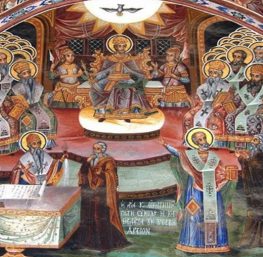Jamie Glazov writes in Front Page Magazine”
The winds of liberty are blowing throughout the Middle East. A peoples’ uprising is transpiring in Lebanon, as citizens of that tortured country courageously confront, in mass numbers, their Syrian oppressors and demand their evacuation. This inspiring scene brings us back to the powerful images of Eastern Europeans rising up against their communist dictators in 1989 and driving them from power.




Lev Nazarov wrote this on Newsmax.com about folks such as Shransky and Jamie Glazer:
“There is a strong similarity between the political worldview of Sharansky and that of Bush because both views stem from the Enlightenment, a European “philosophical movement” of the 18th century that ignored local cultures as “irrational” and postulated Homo sapiens, a universal “man of reason” inhabiting the earth. Bush proceeds from the Homo sapiens of the Founding Fathers, the mental children of the Enlightenment, and Sharansky (for all his “dissidence”!) from the Homo sapiens postulated by Marx, also a mental child of the Enlightenment.
For Bush and Sharansky, the world is populated by Homo sapiens, while the socio-psychological differences between Anglo Saxons, French, Germans, Italians, Russians, Iraqis or Chinese are no more important than differences between languages, dresses, customs and other national peculiarities.
According to Bush and Sharansky, Homo sapiens in the English-speaking countries has been living in democracy, but in other countries, tyrants and terrorists (in the tyrants’ service) forced the French to live under the absolutism of kings and then of Napoleon, the Germans to live under Hitler, the Italians under Mussolini, the Russians under Stalin, and the Iraqis under Saddam Hussein.
What about the Chinese? Here there is a silence on the part of Bush, while Sharansky does not doubt that 1.3 billion Chinese will live in democracy, the Western “power of freedom to overcome tyranny and terror.”
Look at Iraq! Where is Hussein? The Iraqis danced for joy as they voted.
But what if a majority in a country does not want democracy? Thus, in Iraq the Shia voted for a fundamentalist Islamic Shia theocracy, while the Sunni wage a desperate guerrilla-terrorist war for a secular Islamic Sunni oligarchy.
A majority in a country does not want democracy? Impossible! It is the same as saying to Christopher Columbus that the “Indians” of “India” into which he stumbled by mistake do not want to be baptized, or saying to a Communist in Soviet Russia that a majority of Americans do not want Communism.”
Glazer has written well-considered articles on the dangers posed by Islam. Yet even he falls for the idea that letting Muslims vote will somehow make them peaceful and friendly towards the United States. Democracy doesn’t negate culture. Religion and culture matter! All men throughout the world are not the same. For a devout Muslim, freedom often means the right to live under the Sharia.
In the West, we used to understand that. Hence, when the Algerian military overthrew an elected fundamentalist government, we did nothing to oppose it. When the pro-West Turkish military overthrew the government to stop fundamentalists from seizing power, we went along with it. When pro-Western autocrats kept a lid on their fundamentalist populations, we looked the other way.
Now, of course, we have been assured that all men are really the same and that its all just like Eastern Europe circa 1989. It isn’t the same. If the Assad Regime goes in Damascus, who will replace it? The Muslim Brotherhood? Won’t that be great for American interests?
Even in our own hemisphere, democratic doesn’t mean pro-American. Chavez was democratically elected, and he is becoming a major thorn in our side. The French aren’t exactly our biggest fans either, but their government is definitely democratic. If the vast majority of people in a country hate our guts, what, exactly, is the likelihood that they will elect a government that will be peacefully disposed towards us?
Nazarov isn’t characterizing the Sharansky argument properly. It’s not that removing tyrants makes countries more friendly towards “us” (although that certainly may occur), but that countries that allow a measure of freedom are less likely to go to war with each other. Nazarov, it appears, argues that tyranny and oppression are actually a function of culture and religion.
The United States and the Confederate States of America were both Republics. (Though the South had a large slave population, white males were thoroughly enfranchised.) They fought a brutal war that included the infamous ‘March to the Sea.’
Britain was a constitutional monarchy during the time that it planted the British flag around the world, seizing control of whole nations on multiple continents. The fact that it had a Parliament and free speech did precious little to stop its international belligerency.
The U.S. was a Republic in 1898, that did nothing to stop it from annexing the Phillippines against the will of its people. Nor did it stop the U.S. from waging a 10 year war at the cost of 250,000 lives to bring the Filipinos to heel. Come to think of it, the fact that the U.S. was a republic didn’t stop it from annexing Hawaii either, a formerly independent nation whose government was illegally overthrown by U.S. citizens.
Historically, republics or democracies are quite rare, so generalizing about them is more difficult than doing so about monarchies. However, one thing certainly stands out – they are far from peaceful. The U.S., for example, attacked Mexico on the flimiest of pretexts and seized the entire Southwest. The U.S., after suffering through the Civil War, was a veritable powerhouse of intervention in Latin America throughout the late 1900’s and early 20th Century. If nothing else, our own history and that of Britain belies the idea that simply having an elected government makes a nation peaceful.
As for culture and religion playing a role in the style of government a nation prefers, are you really going to argue that they don’t? Haven’t you printed articles and stated over and over again that religion is the fountain of culture? I agree with that. Democracy is a method of arranging an orderly transition of power on a scheduled basis. It is not a creed. A nation’s political style is going to depend quite heavily on the religion that lies at the basis of its culture. That is one reason why so many Constitutions foisted upon former colonies were still born.
Islam is a totalitarian system. Father, you have printed articles to that effect and you are right to do so. Then, you turn around and endorse the proposition that Muslims can erect a peaceful Jeffersonian republic simply because they will be given the right to vote. When given the right to vote, they usually vote for religiously-based candidates who instituted some form of the Sharia. Take a look at the election in Iraq in which the Sistani-linked candidates were the clear winners.
What I fear is that Sharanksy and Bush will lead us to spend even more billions of dollars, and even more thousands of lives in the Middle East, and at the end of the day, we will have erected a series of Shiite dominated pseudo-democracies with clerics firmly in control of societies imprisoned by the Sharia and with massively belligerent attitudes.
Back up a few steps Glen. There is no “endorsement” that “Muslims can erect a peaceful Jeffersonian republic simply because they will be given the right to vote.” I would not argue this point, but I don’t think Sharansky does either — regardless of what his detractors say. Read note 2 a bit more closely.
That may well be that I am misrepresenting Sharansky’s case. If so, then it is being commonly misrepresented. Here is an example from MSNBC:
“Now a hawkish member of the Israeli government, Sharansky has written a new book, “The Case for Democracy,” arguing that democratic change leads to peace.
What Americans heard in the president’s inaugural address – a promise to end tyranny around the world – was Sharansky’s voice, suggesting that democracies don’t start wars.”
This is what people are taking away from Sharansky’s argument. If we can just get people to vote, then the resulting democracies will be peaceful. There is no empirical evidence for such assertions, as I stated in my previous post. This is a statement of faith, not a historically provable hypothesis.
Whether Sharansky meant to imply this or not, this is the version that has been put out for mass consumption. It is also the cover that is likely to be used by President Bush for future interventions around the Middle East. Spreading Democracy has now become a policy goal all by itself, with the understanding that Democracies are automatically peaceful and that whatever follows ‘regime change’ must be better than what went before.
If Sharansky didn’t mean this to be taken in this manner, then I suggest that he get busy correcting the public discourse. However, I expect him to remain remarkably quiet on the subject.
I can’t speak to the misrepresentations. Sharansky’s thesis is what I outlined in my review of his book. His belief is that when offered the opportunity for freedom over tyranny, most men will choose freedom. He also argues that empowering dissidents is a powerful way to destabilize illegitimate and tyranical regimes, particularly those that increase instability in the world.
We could go around and around over all this, but I will just leave this thread with one question that I would appreciate your answer to.
If a majority of voters in a new Democracy defines freedom as the right to live under the Sharia, what does this do to Sharansky’s thesis?
In such a case, people actually desire to live under what we in the West would consider tyranny, but which their religion states is the natural order of man.
Well?
If people choose tyranny, tyranny it is.